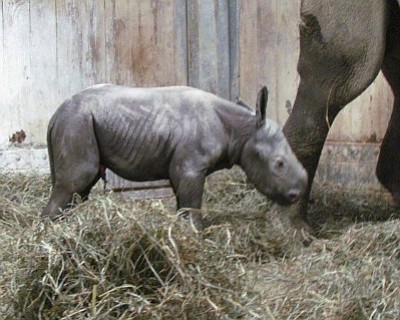Fiona the hippopotamus is going to have to share the limelight with Kendi, an eastern black rhino born Monday at the Cincinnati Zoo and Botanical Garden.
After a 15-month gestation period, Seyia gave birth to the healthy calf at 5:05 a.m. Monday after about 30 minutes of labor. Surveillance cameras inside the rhino barn recorded the birth and the mom and baby’s first moments.
“Every rhino calf born is incredibly important for the population, which includes fewer than 60 in North America. Calves will stay with their mothers for three to four years, which means that the average female can only have one calf every five years,” said Christina Gorsuch, curator of mammals at the Cincinnati Zoo. “This calf is only the fifth eastern black rhino born in the last two years in North America. Only one surviving calf was born in 2014/2015.”
The rhino care team is keeping its distance from Seyia and Kendi during this critical bonding period, so they have not yet been able to determine the calf’s sex. The staff voted to name the calf “Kendi,” which means “the loved one” in Swahili.
In 2015, the Association of Zoos and Aquariums’ Species Survival Plan, the body that manages populations in zoos, determined that parents Faru and Seyia were a good genetic match and recommended that they breed. Faru came to Cincinnati from Atlanta in the summer of 2015 and met Seyia.
Eastern black rhinos, native to Eastern and Central Africa, have two large horns made of keratin that they use for defense, intimidation and feeding. An adult can weigh anywhere between 1,760 and 3,080 pounds, and newborns weigh between 73 and 121 pounds. The species is critically endangered due to poaching and habitat loss. Fewer than 5,000 black rhinos remain in the world, and approximately 60 are managed by the species survival plan in North American zoos.
The public will be able to see Kendi and Seyia in their outdoor habitat in a couple of weeks, weather and health depending. The father, Faru, will be out daily. Black rhinos are solitary animals, so there are no plans to unite the three. Look for updates on the calf’s progress at the Cincinnati Zoo’s website and social media accounts.
